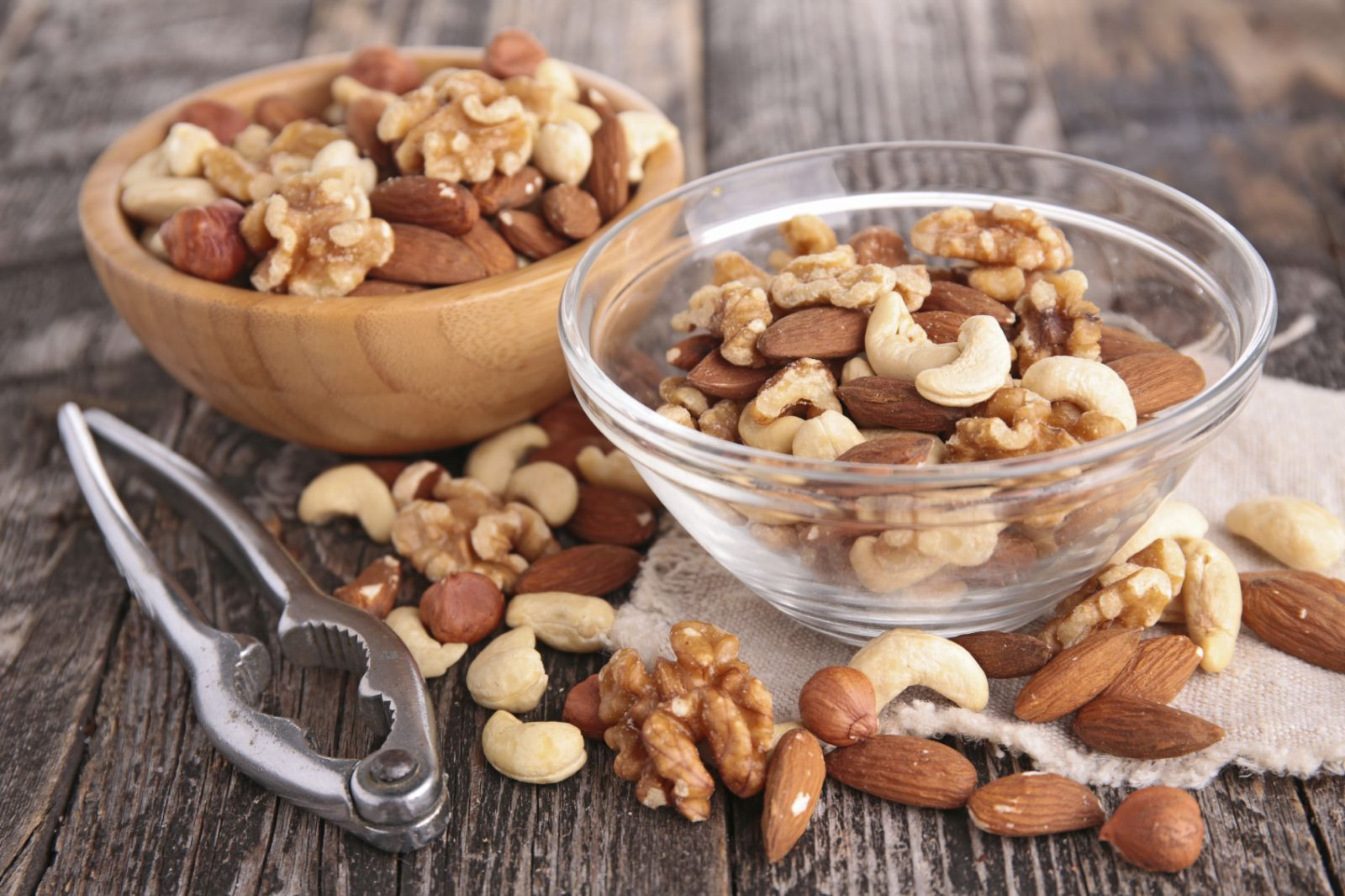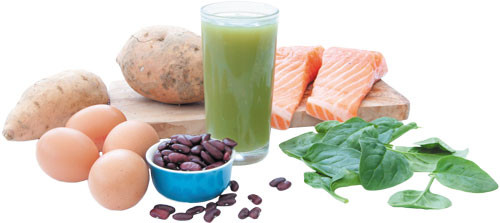
Counting steps is good — is combining steps and heart rate better?

Appendix pain: Could it be appendicitis?

Can saw palmetto treat an enlarged prostate?

How does Ozempic work? Understanding GLP-1s for diabetes, weight loss, and beyond

Zinc: What it does for the body, and the best food sources

Respiratory health harms often follow flooding: Taking these steps can help

Tips to leverage neuroplasticity to maintain cognitive fitness as you age

Can white noise really help you sleep better?

Celiac disease: Exploring four myths

What is prostatitis and how is it treated?
Nutrition Archive
Articles
Should you go organic?
Organic produce may have fewer pesticide residues than conventionally grown produce. But the amounts for both are within the levels for safe consumption. Image: Thinkstock |
These foods are grown without fertilizers, pesticides, and other synthetic additives. But are they better for you?
Walk through any grocery store today, and you'll likely see more shelf space devoted to organics—foods that are grown without most synthetic fertilizers and pesticides, and animal products that are free of antibiotics and hormones. Demand for organic food is up, with sales reaching $35.9 billion in 2014. "I think people believe these foods are better for them, but we really don't know that they are," says registered dietitian Kathy McManus, director of the Department of Nutrition at Harvard-affiliated Brigham and Women's Hospital.
Ask the doctor: Healthy nuts: How much should I eat?
Ask the doctor
Image: iStock |
Q: I've read a lot lately about nuts and how they prevent heart disease. How much should I eat, and are some nuts healthier than others?
A: Nuts contain high amounts of polyunsaturated fat and are a staple in the popular Mediterranean diet. Commonly studied nuts include walnuts and almonds, which have been shown in short-term studies to lower cholesterol. In the PREDIMED trial, a Mediterranean diet supplemented with 30 grams of nuts daily reduced the risk of heart disease. Thirty grams of nuts is equal to about 20 almonds or 10 walnuts. In other studies that showed health benefits from nuts, the frequency of consumption was recorded, not the amount. Daily consumption appeared to be best.
Do you eat enough protein?
Obtain the moderate amount of protein you need from a variety of nutritious foods—not just meat.
To meet your daily protein needs, combine small to medium portions of meat, dairy, and nuts with protein-rich whole grains, legumes, and vegetables.
Protein is essential to good health. You need it to make the bricks and mortar of the body, including muscle, bone, and blood. But how much protein does the average man need in order to stay healthy?
Breakfast-skippers: Don't forget your fruits and grains
| Image: Thinkstock |
Skipping breakfast can reduce the overall number of healthy fruits and whole grains that you eat, according to a study in The American Journal of Clinical Nutrition. To study the impact of breakfast skipping, researchers drew on data collected from 2005 to 2010 in a national survey. Here are the key findings:
Breakfast skippers were apparently hungrier at lunch, since they tended to eat a half-hour earlier than usual and ate more calories—about 200 extra for men.
8 ways to eat more fruits and vegetables
| Image: iStock |
They're full of the nutrients you need for a healthy heart.
That familiar refrain "Eat your vegetables!" still hasn't sunk in. Only about one in 10 adults in the United States eats the amount recommended by the current federal dietary guidelines. And we're not doing much better when it comes to fruit, according to a recent report from the CDC (see "How much should you be eating?" below).
Water and health: Follow your thirst
| Image: Thinkstock |
Most men can get the water they need from their usual diet and by drinking when they are thirsty.
Especially in hot weather, we are urged to drink adequate fluids and be on guard for dehydration. That may be why you see people toting bottled water everywhere, propelled by the myth that you need to drink eight glasses of water a day to be healthy.
DASH or Mediterranean: Which diet is better for you?
Both eating plans have proven health benefits. Deciding which to follow depends on your goals and preferences.
The DASH diet has been named the best diet in the United States by U.S. News and World Report. However, the U.S. government panel writing the 2015 Dietary Guidelines for Americans cited the Mediterranean diet as an example of how we should eat. If you're trying to choose the best eating plan to lower your health risks, which one should it be?
Stop the carb confusion
Some carbohydrates are healthier than others, and eating too many processed carbs can harm your health.
Carbohydrates—or "carbs" for short—play a starring role in many healthy diets. For example, carb-rich whole grains, fruits, and vegetables are at the core of the heart-healthy Mediterranean and DASH diets.
Snacks: Quality vs. frequency
When it comes to snacking, is what you eat more important than how often you snack? A study published in the July 2015 Journal of the Academy of Nutrition and Dietetics tracked the snacking habits and foods of more than 200 people (average age 42). After two-and-a-half years, researchers observed that people who snacked on fruits and vegetables had, on average, a lower body mass index (BMI) than people who snacked on desserts and sweets. BMI is a measure of body fat based on a person's height and weight. Calories, frequency of snacking, and the time of day snacks were eaten didn't seem to affect BMI.
The study didn't show that the quality of snacks people ate was responsible for the lower BMI. However, researchers say the findings support the idea that wise snack choices can contribute to a healthy diet, and that snacking isn't necessarily unhealthy unless you choose empty calories such as chips, desserts, and sugar-sweetened drinks. Kathy McManus, director of the Department of Nutrition at Harvard-affiliated Brigham and Women's Hospital, underscores the importance of that approach: "Timing or frequency is not as important, as long as healthy snacks are selected." She recommends nuts such as almonds, peanuts, pistachios, or hazelnuts; hummus with baby carrots; peanut butter with celery or an apple; part-skim string cheese with a small bunch of grapes; or plain nonfat Greek yogurt with blueberries.
The official ousting of artificial trans fats
The FDA is giving companies until 2018 to either stop using partially hydrogenated oils in foods or file for an FDA okay to keep using them.

Counting steps is good — is combining steps and heart rate better?

Appendix pain: Could it be appendicitis?

Can saw palmetto treat an enlarged prostate?

How does Ozempic work? Understanding GLP-1s for diabetes, weight loss, and beyond

Zinc: What it does for the body, and the best food sources

Respiratory health harms often follow flooding: Taking these steps can help

Tips to leverage neuroplasticity to maintain cognitive fitness as you age

Can white noise really help you sleep better?

Celiac disease: Exploring four myths

What is prostatitis and how is it treated?
Free Healthbeat Signup
Get the latest in health news delivered to your inbox!
Sign Up











